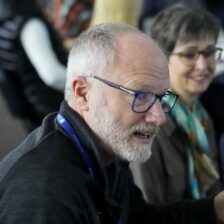 Madison’s question to Matthew: How has the church engaged in issues of justice over time?
Madison’s question to Matthew: How has the church engaged in issues of justice over time?
Let me begin by stating that I am not a history expert on the church. I have done some reading and am always looking to learn from churches of all types. I always appreciate it when an author addresses church lessons from history, after all, there really is nothing new under the sun, we keep repeating the same mistakes.
From an extremely simplistic view, in the 20th century, the church in North America spent time dividing itself into two major camps – liberal and conservative. In essence, the liberal church engaged in acts of social justice but forgot about Jesus and the bible. The conservative church embraced Jesus and personal salvation but forgot about issues of social justice. Why did this happen? There are many theories and thoughts. Perhaps each “camp” had some ideas and wanted to prove to the other “camp” that their emphasis was the correct emphasis.
I am often drawn back to Ephesians 4:11-12. Now these are the gifts Christ gave to the church: the apostles, the prophets, the evangelists, and the pastors and teachers. Their responsibility is to equip God’s people to do his work and build up the church, the body of Christ.
It is intriguing how churches choose to have specific voices (gifts) speak into their community life yet never really allow all 5 voices to speak.
Most church plants are started by the apostle and the evangelist. Yet, amazingly, once this new church is several years into its journey, those that are part of it want the emphasis of growing in their faith and prefer the teacher. They also have needs that come up and need a pastor/shepherd to guide them. Thus this new church shifts its focus.
And in reality, living with an apostle (taking new hills) can get exhausting. Continually having new people come to faith with the work of the evangelist with all of the mess of new believers can become disorienting for those who are trying to set down foundations of faith. And the prophet, revealing our gaps and calling us to reach out to the disadvantaged can be draining, after all, we’re doing the best we can.
Now I’m a pastor of a local church, and I know that I too am at risk of highlighting one or two voices and not allowing them all to speak – in reality, I have my own leanings because I have been gifted specifically. However, if Jesus gave them all for the sake of the church (this would be the universal church that he is speaking to of course, yet shouldn’t a local church be reaching for the blend of them all), how am I to ensure that we are hearing from them all?
There are a lot of books that come out about how to structure and run a church, and I have read many of them. Each one claims to have the answer, the formula that worked for some church somewhere in North America at a particular time. Having been a pastor for 14 years now and heavily involved in my local church for 14 years prior to that, I have seen many things come and go. In chatting with some church veterans who are 15-20 years my senior, they often smile at the “new thing” that churches are doing, when in reality it is simply a rework of something from the 1970’s or before – there is nothing new under the sun.
One such book that came out was titled “Simple Church.” It was meant to help tired church leaders to have a focus and not burn out. Always a very noble idea, and perhaps many churches are doing a lot of things that have no real purpose to the mission of their church (or any church for that matter). The reality is that spiritual maturity, or discipleship, is very complex. The Holy Spirit is prodding each of us differently. We all have our “stuff” that we are working through. God is extremely gracious and moves in each of our lives in unique ways.
So, as I look at the church and its response to issues of social justice, I think too often it has appeared to be too complicated to engage in, and that the people who are a part of the church want to be cared for with respect to their needs and that there hasn’t been any time to think about let alone engage in the issues of justice. And yet the reality is, we are only going to experience the fullness of Jesus when we choose to accept the many facets of our faith. When we allow the apostle, prophet, evangelist, pastor, and teacher to have a voice in our churches and our lives individually.
As a pastor, I would definitely appreciate having a simpler life, having to only engage in one or two things. And yet, the longer I’m on this journey, the more I realize that we need to embrace the many complexities of our faith journey. It won’t always be easy, but God calls us into this. I know that I have an incredible responsibility to guide the local church that I lead into all aspects of faith. It is my prayer that those I lead will also see the need to engage broadly so that together we show that we are the hands and feet of Jesus.
For the kingdom.
